|
This week I was honoured to be included in The Big Issue’s national 100 Changemakers 2024 list, for my work with the charity project I founded, Mothers Uncovered. We empower women in matrescence, meaning the transition to motherhood. I also advocate nationally for investment into maternal mental health and for families, last year mounting a campaign around the increase in working hours for parents on universal credit, which has received huge traction.
However, at the same time as receiving this excellent recognition, we have had to take the heartbreaking decision to pause our life-saving work with mothers, over half being new, first-time parents, many of whom have suffered birth trauma. We simply can’t afford to keep going. This really hurts, as we know too many women are suffering in silence. It seems almost every week there is a news item about a crisis in maternity care: unsafe hospital wards, shortage of midwives, over 11,500 new mothers unable to access mental health care. They are forced to deal alone with anxiety, loneliness and postnatal depression, and in more serious cases postpartum psychosis that can emerge after the birth. As an entirely peer-led network, since 2008 nearly 3000 women have benefitted from our post-natal groups using facilitated discussion and guided arts activities at Mothers Uncovered. As well as combatting isolation, we help mothers understand that they matter in their own right as women. Our non-judgmental, supportive groups inspire the mothers to take ownership of their lives going forward, knowing they have a community they can rely on. We operate on a shoestring, but we can’t exist on thin air. It’s not only the mothers we work with that suffer if we can’t operate, but the team of facilitators, who are all past participants and value the opportunity to do meaningful, life-enhancing work that fits in with their childcaring responsibilities. My co-director and I have been working on an almost voluntary basis for the last two months, desperately trying to bring in extra funds. If they don’t come soon, we will both have to seek other employment. Our lack of money is not through want of trying. Last year, we applied for nearly fifty funding opportunities. We received just ten, and most of those were for just a couple of thousand pounds. The feedback was that there was nothing wrong with our bids, it was just the competitive landscape. A funder told me once informally; ‘Unless there is a threat to the child’s life, mothers will never be the priority when it comes to funding.’ And we are proof of that. The category of ‘mothers’ runs into the millions, a big amorphous mass of different needs and life circumstances. The world has survived for generations, so they must be managing, goes the logic. There is always a strata of society seen as more deserving of money, and mothers often get short shrift on social media if they speak up about struggling. Be grateful, goes the mantra, or ‘in my day’, we didn’t have all this help. But if a mother isn’t supported properly, there is a very real risk to the health of the whole family and many studies conducted have proved this. One of our five week groups, which supports eight mothers, costs about £1500 to run. That is the cost of a hospital bed for ONE night. Many past participants say attending has stopped them needing to receive further help. ‘It pulled [Nicky] from the brink of post-natal depression.’ This was following the birth of her third child. Had her mental health deteriorated further, she might have needed medical intervention, maybe even a stay in a costly Mother and Baby unit. Just this week, I was contacted by a health visitor asking if we had any of our birth trauma sessions scheduled. I explained our current position, which she was sorry to hear, ‘I have had really good feedback from mums who attended this month and feel it would benefit many more.’ I was that panicky, lonely mother facing depression once. If the NHS is struggling to support women because of stretched resources and small charities like Mothers Uncovered aren’t able to help women like me, what will the cost be? Heidi, a participant in our very first group, who subsequently became a facilitator, said ‘Mothers Uncovered saved me. There’s no other way of putting it.’ To support Mothers Uncovered, donate here
0 Comments
The cat and I have been in a standoff for a couple of weeks now. Cats sit where they please, every ‘owner’ knows that. Any new item placed on the floor: a discarded hoodie, shopping, a visitor’s shoes, will invariably be sat upon. Special bonus points for if you have a map upon the floor (sometimes Google maps on the phone doesn’t quite cut it) which provides excellent strolling territory for said feline.
I read somewhere that cats spend about 70% of their lives asleep. Small wonder then that each inch of a home is used in the quest for eternal rest. Normally this is not a problem. Our cat, Colette, perambulates between chairs, beds and particular spots of a carpet. However a niggling back pain caused me to try out a new cushion on my desk chair. It sits atop a strange bobbly plastic disc that has been there awhile that is supposed to keep you centred. That hadn’t seemed to do much for the niggle, but the cushion has taken it away completely. But, and you see where this is going, the cat likes the cushion too. Every time I go to my desk she is curled up on it, contentedly napping. THIS, she silently indicates, THIS CUSHION, was all I needed for my final comfort. If I go to the loo, she is in place by the time I get back. There was a period of time when she liked my son’s desk chair. He, being far softer than me, would pull up another chair and lean awkwardly over, so as not to disturb her. I have no truck with that. I scoop her unceremoniously to the floor and reclaim my space. She turns her back on me, indignation emanating from every hair. ‘I have to sit here,’ I tell her. ‘This is where I have to sit if I need my computer.’ Silence. If she’s feeling particularly malevolent, she might choose to leap onto the keyboard just when I’m least expecting it, or hove into view when I’m on a Zoom call. I suspect this may go on a while, as the chair has clearly become a Holy Grail in her little cat mind. Cushion-gate is an amusing interlude in the ever grey of the English winter, a season of failed New Year’s intentions, the warmth of spring feeling an eternity away. A friend popped round the other day. She was disconsolate because she hadn’t managed Dry January intact. She’d cracked on the 14th. Which I said was very respectable. I told her I was more of an advocate for Moist January, where you identify in advance a few key dates in the month when you’ll have a modest amount of booze – a friend’s birthday, perhaps. Otherwise it’s relentingly cruel at this time of year. Every hungover New Year’s Day, thousands sign up for the challenge eagerly; the pounding in their head, coupled with the general excess over the festive fortnight, leads them to reach out for a healthy regime of mostly veg and no alcohol. It seems thoroughly desirable and inviting, you can’t imagine EVER wanting to drink again….. Roll ahead to the 7th or 8th and actually a little nip of wine at the weekend would be just the…oh. So you resist, but come the next weekend or the one after, God, January’s LONG, isn’t it…?!, most crack I suspect. Then feel bad and berate themselves. No other time of year has this period of excess prior. It is a natural time to do it, and yet SUCH the wrong time. Do it in March, if you must. But do it because you truly want to. Otherwise, invest in one of the ever increasing excellent substitutes to reduce your intake – I’m a fan of Nozecco. I’m not quite sure why I’ve ‘portmanteaud’ the cat and not drinking into one piece, except I’d wanted to write about Dry January before now and here we are in the tail end of Feb. It must be all those never ending funding applications (mostly unsuccessful) taking up my time. Well, cats can teach us a lot about abstinence. As in, they don’t believe in it. They do what they want and to hell with the rest of you. Happy Tail End Of Winter…. Finally, our much delayed Youth Club Experience: A Slice of the 80s was presented at Brighton Youth Centre as part of the Brighton Fringe. The audience were attending as if they were coming to the youth club. They were encouraged to dress the part and they took part in activities before coming together to be awarded prizes and do a silly dance. Overseeing this were the actors, who were members of ‘Ofyouth’, dedicated to ensuring the activities were being carried out in an authentic fashion (which involved tape measures, stopwatches and clipboards)
Our Uncorked shows are immersive, meaning that the ‘audience’ are, in fact, participants. The words ‘audience participation’ alarms people sometimes, they imagine it as being like a comedy night, where the comedian will target them sitting quietly in the audience to make a joke at their expense. In our shows, there is usually a social issue being explored, such as whether a library should charge hire fees, or which service an overstretched hospital should drop. The ‘audience’ are concerned local citizens, who engage in debate with the ‘characters’ (the actors who play a key role within the drama), which happens simultaneously all round the performance space, as if chatting at a party. This is normally followed by a debate or meeting, where the audience becomes a more traditional one, as they sit and watch, but they are still invited to contribute. At no point is anyone forced to engage, or have others watching them as they are ‘performing’. I tell people it’s like a ‘Murder Mystery’ event, to give them a frame of reference, but it isn’t really. It’s much more creative and people normally throw themselves into it with gusto and have a great time. Even though we explain it is fiction and the action ends with the ‘actors’ bowing, we still have people thinking the planned scenarios are real and asking if they should contact the council/press about them. Sometimes authenticity means we skate perilously close to the wind. So it was for this show. As we all know, health and safety has changed since the 80s. Gone is smoking in public places/on transport, dangerous play equipment, everyone all piled into a car because there were no seatbelts, children walking anywhere on their own until they reach age 10 or being able to buy alcohol for their parents. These are good things, I’m not denying! The downside might be a reduced ability in light-heartedness. Within the description of the show was contained the line: ‘You will not be checked for illegal substances and unauthorised weapons at the door (unless you want to be....)’. Because in the 80s, no-one would have thought of such a thing. And the bit in parenthesis was our slightly risqué remark. When I arrived at the venue on the first night, Mike (CEO of BYC) informed me he’d been called by the police that day. Someone had made a complaint about this line in the show description and the fear was that it would actively encourage people to rock up to a fringe show in a youth club wearing silly costumes with their pockets stuffed full of things they shouldn’t have. Mike, having first assumed this was a wind-up, swiftly realised it wasn’t put them straight on the nature of the show and to smooth things over, the line was removed from the Fringe listing. It was a shame this hadn’t happened earlier, as we could have got press coverage out of it and been a sellout! Below is the review from Sophie, volunteer for Livestock… This 80s immersive show was radical. The characters of the inspectors were very comical and really added to the experience of a youth club centre in the 80s. The activities were hella creative and the splitting of teams was reminiscent of being young. It was an extremely fun evening filled with exercises, sugar highs, and realisation of how shockingly bad our 80s knowledge was in the quiz. The evening was all beautifully finished off with a stellar dance off with creative 80s dancing moves performed by the youth club guests. Overall it was a bodacious youth club experience. The Star Wars pen and love hearts were also dope. (Can you spot the five 80s words?) Ann Gordon-Walker, Feb 1944 – Jan 2021
My indomitable aunt has just died of cancer. It’s Holocaust Memorial Day (Jan 27th) – I’d found a BBC clip of Patrick, her father, who the whole family called Poppa, speaking about entering the Belsen concentration camp after it was liberated and sent it to my cousin Jenny, who has been with her these last weeks. In fact Jenny couldn’t play it, being outside the UK. I found another to send her. Somehow, it felt very important to me that Ann could hear it. She wrote: ‘I played that recording for her this morning….just before she passed away.’ When I sent the clip I wondered if that might be the thing that would end the half waking state that she has been in the last three weeks. They say hearing is the last sense to go. Perhaps she had a sense that he was calling her home. I’m somewhat hazy on the facts from her early life, but I’m told she was born in an air raid. What is certainly true is that when she was barely a year old, she acquired two older sisters, returned from five years of evacuation with grandparents in Jamaica – more about that here https://maggiegordon-walker.com/2019/01/03/audrey-rudolf-03-january-2019/ and the following year acquired twin brothers. If there’s anyone who could lay claim to being more middly a middle child, I’d like to meet them. That dramatic start in life gave her a certain toughness, occasionally brusque, but she truly loved and cared for all the family and had a wide circle of friends. Jenny, her older daughter, wrote to me the other day, ‘she adores you, you know’ and the feeling was definitely mutual. She had five grandchildren: Cassie, Scarlett, Quinn, Dominic and Logan and a whole host of great nephews and nieces. Ann was a scientist. She liked hard facts. She was also a big fan of Jane Austen, drinking, walks, tennis, racing demon (at which she was particularly brutal, with no suggestion of pandering to younger and/or more sensitive family members) and pork pies, which were unknown in the States. Whenever she made one of her many visits to see the family in the UK, she’d be showered with them. She moved with her husband Andy to the States in the mid 70s, first to Connecticut (I think), then settling in Madison, Wisconsin, with Jenny and their second daughter, Kate. She worked in the university there, moving from the lab to an office in later years. Her marriage ended in the early 80s and she had liaisons subsequently (some of which I know about!), but never remarried or lived with anyone again. What I remember best is the various holidays. When young, we went twice to Trout Lake in Noth Wisconsin, building us a little den on an island and camped in the Smoky Mountains. Lots of mosquitos in both locations. When I was 15, I spent a month with her and my cousins while my parents were in Thailand. I’d kind of hoped I’d meet an all-American boy for the summer, as the girls did in the teen romances I was reading. That didn’t happen, there was a lot of ‘Annie’ roleplay with my younger cousins, entranced by the film, while she was at work. We did go to Trout Lake again and to Great America theme park. ‘Wake up!’ she shouted while we were on the long drive there, with my cousins slumbering in the back. ‘I need someone to talk to so I don’t go off the road.’ She came to Greece with the girls and our family, one night spraining her ankle on the dimly lit path (too much retsina, I’d say). Then, when I was about 17, she joined me and my parents on a holiday in Tunisia. I was delighted to share a room with her – being an only child was often lonely, and she did feel big-sisterish, I could certainly felt I could talk to her more as an equal. She was always interested in life, in learning what others were up to. One night, I tiptoed in gingerly quite late, having finally managed to snare the waiter I liked for a kiss, only to find she wasn’t there. She came in later still, back from her own ‘romantic walk’ with a fellow guest. We giggled at our naughtiness and agreed not to tell my parents. At the time, with all the arrogance of teenagerdom, I felt faintly surprised you’d still do that kind of thing at ‘her age’. She was only in her early 40s at the time. The best most recent memories I have are from 2017, first when my boys and I visited on our tour of the States in the summer, then when she joined us for a week on Gran Canaria in the autumn with my mother. The second was more fun, I think she felt the pressure of hosting, having lived on her own for a long time, especially with my boys’ impending teen tendency to loll about and not leap up enthusiastically for walks. They did learn Racing Demon though. Gran Canaria was an absolute hoot. The boys saw here was someone who could outdrink and outswear their mother – always good! The defining moment was when the five of us tried to take a bus to a nearby beach, but were confusedly standing on the wrong side of the road. A local gave us directions, then the four of them moved off, while I thanked him. ‘Is that four generations?’ he asked. I said no, the two of them were sisters, with six years between them (although my mother’s burgeoning, but as yet undiagnosed dementia, was aging her quickly). I told Ann this privately later and she punched the air in impish delight. We didn’t tell the others. As I pointed out, it favoured her (and me probably), but not them! She’d had cancer twice before, breast in the late 80s, which was successfully treated. I remember one lunch party, when her wig nearly slipped in front of my grandmother and had to be hastily restored as their mother didn’t know about it – they all avoided telling her about illness or misfortune, as she would work herself into a frenzy of worry. (As it was, she talked incessantly about one of her son’s piles as if it were a death sentence). Then skin cancer, then finally this, oesophagus, that spread to the lungs. She hung on in there though. Jenny and I speculated that it was Biden’s inauguration she was waiting for, just to make sure the orange monstrosity was finally gone. The last conversation I had, via Whatsapp, she managed to mumble ‘I’m not very well’, in true understated fashion. I will miss you Ann. Always. xx It’s been weeks since I set my alarm in the morning. Nearly seven weeks, in fact. The only point in my life this feels comparable to is when I became a mother for the first time. This whole period feels like that: time has no discernible meaning. My diary has emptied of engagements, excepting the various social and work Zoom calls scheduled in. I am alternately fired up to do something and also lethargic. My mind races, yet has trouble focusing. Where once I fussed over every little symptom my newborn might display, that anxious monitoring has shifted to myself. Do I feel a little hot? Is that a scratchy throat? I start up in the night in fear of a cough.
I go to bed before my boys. Like Canute and the encroaching tide (in fact he was trying to indicate the futility of holding back the waves, not display mastery over them, but history has been unkind to this particular king), it seems pointless to insist they operate on a timescale different to their natural biology. The 9-5 timetable is designed for adults, not tinies, toddlers or teens. They go to bed around 2.00am, I winch them out just shy of midday. At the weekends, it’s later. They ‘break fast’ when I have my lunch, we eat together in the evening and the kitchen displays signs of their breakfast cereal and toast consumed at midnight when I come down in the morning. I quite enjoy my quiet mornings. I manage to get some work done, I have even tackled some of the piles of paperwork. I too have adapted slightly. I sleep less than seven hours at night, automatically waking between 7.00 and 8.00, yet have a nap most afternoons. Well, if it’s good enough for our beloved (by me) Europeans, it’s good enough for me. I am ‘stoked’ beyond belief to find that the Clairol root touch up hair dye I got actually did work as the marketing claimed it would! I don’t groom myself especially, just my hair. I shower every day, but am lax with the washing of clothes (fresh pants and socks every day though, I’m not an animal 😉). Consequently the washing machine runs less, yet the dishwasher runs more. No-one is out to lunch OR dinner, although we do treat ourselves to a once a week takeaway/ ready meal. I drink more wine than I did, but not every night. Yet… I have managed to move some of our work online and I’ve become heavily involved in the campaign for Basic Income. Initially this was just a distraction from a romantic relationship that derailed just as lockdown began. The baggage I thought he was dealing with overwhelmed him and he scuttled off, dumping me in cowardly fashion by text. But activism is a brilliant cure for a broken heart, especially a cause as worthy as this. Activists from up and down the country converge in our various WhatsApp groups, reporting on another MP or public figure who has joined the fold. The fact that I have now been on Zoom calls with various MPs on the topic, as representative of Mothers Uncovered will, I hope, further our cause for the prominence of mothers’ wellbeing and recognition of matrescence in time. Routines do form I’ve noticed. It’s a singular person indeed, who has no routine or rituals in their life. Look how eagerly the Brits have grasped at the Thursday night clap. The clapping has been superseded by general banging of implements to make a damn great noise and the swift catching up of news with neighbours. We all hope an emergency vehicle might go by as we’re standing there (10 points) so we can show our appreciation, but will settle for a delivery van or bus (5 points). Or at the very least, any car beeping. (1 point). Other rituals chez moi have been adopted. Monday brunch - well, why not have it on a weekday? It means I can commence the gentle nagging that they do their schoolwork this week, get some exercise, get dressed FFS. Midweek brings my shopping delivery, that has to be carefully edited and missing items subsequently bought in the local shop. Friday nights I seem to have stumbled into a dance in my kitchen to some old skool pop from my Alexa playlist, accompanied reluctantly by my cat. I upload this to Facebook, as friends claim they like it. Well, some of them anyway, I guess the others muted me some time back… Saturday I do some cleaning and make the boys vacuum. We have our regular (from before) weekend morning ritual of bacon with either pancakes or French toast. I also have a socially distanced coffee in the garden with my lovely neighbours - one standing at our dividing wall, the other just inside the back gate. Then in the evening we have our shop bought or takeaway pizza and watch a film. Wow. Saturday is busy right! I should probably spread things out. Who knows how much longer this may last? Sunday still feels typically Sunday-ish. It always will. I have nothing new or enlightening to say about New Year and the compulsion to make resolutions. Most seem doomed to failure. Dry January, for example. It’s understandable you’d want a few days off after the excesses of the holidays, but in the coldest, wettest month of the year, surely anything that gets you through it is a bonus? March is the best month to be abstemious I would have thought, when the days are lighter (if not warmer) and the clocks go forward, but it is unlikely that you will have to expose too much of yourself to a harsh glare, so any winter excesses can be shed gently.
I’m a bit maudlin today as it was time for the tree to be disrobed of its finery and taken down to join its friends in the recycling area of the park. It was Son Number One’s lucky task to accompany me there. Normally I can drag it myself, but this was a fiendishly large one – Son Number Two had accompanied me to buy it. Less is never more in his opinion. ‘Why don’t we get a fake one?’ grumbled SN1 (although gently, as he knows how much I like my tree), as we wiggled it inelegantly out of the front door, it merrily discarding its needles on the way. No, a fake one will not do at all. We are surrounded by fakery. Perhaps ‘no fakery’ is a good NY resolution. Although I don’t like the fact that most resolutions involve censoring and denial in some way. They always focus on minimising. Dry January. Veganuary. How about more? Not less. Not censorious. It’s a matter of semantics, of language. Not ‘cutting out toxic people in your life’ but ‘filling it with people you love instead’ so the others fade into the background. Rather than being suckered into swimming in the cesspit on twitter, only follow accounts of those you like, love or admire. Notice that a right-wing extremist is trending and choose instead to find a picture of a fluffy kitten. 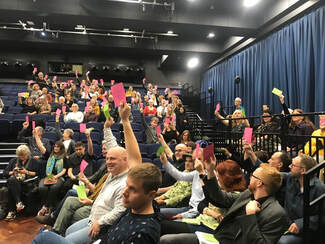 People's Parliament, Brighton. I'm in this - can you spot me? ;-) People's Parliament, Brighton. I'm in this - can you spot me? ;-) I recently watched 'State of the Union' - essentially a two-hander (with a couple of short cameos) with Rosamund Pike and Chris O'Dowd dissecting their marriage in ten episodes, each lasting about ten minutes, all set in a trendy pub over the road from their therapist's house. So a film-length piece, in essence, although much better for being divided into these chunks, especially as it was so pithy. It was sharp, bittersweet and funny. The only thing that bugged me - and it's a tiny thing, but I'm pedantic like that :-) - was in one episode he handed over a ten pound note for their drinks and received some coins in change. I THINK it was a tenner anyway, I rewound it to watch. Now, we imagine this drama to be set in London - it's either that or some other urban, expensive patch, what with the stripped pine, vases of single, tasteful flower on the tables and all. Are you telling me you'd have ANY change left from a tenner when buying a pint and a very large glass of wine?! I don't think so. You'd be looking at around £12 for that I reckon. There, feel better for that now. How nice to be nit-picky on the page rather than in my head. Something else I did was go to the People's Parliament event in Brighton at the weekend. Some gammons got over-excited on Twitter, claiming there were only enough people to fit in a phone box attending. Maybe they've got access to the Tardis. There were about 120 there, I reckon. Admittedly the venue holds more, so there were empty seats, but it wasn't supposed to be a rally or demonstration - more a chance for citizens to ask questions of the 3 MPs (Lucas, Russell-Moyle, Kyle) and engage in debate. As it was, only a proportion of those who wanted to raise a point got the chance to do so. No surprises that Brexit took up most of the debate, much to Caroline's irritation. Others too, including mine, when the question we were asked to address was: 'How do communities come together after it?' rather than an endless back and forth about 'will of the people' and 'democracy' and 'who's right' and so on. I did manage to raise a point about the need for smaller, third sector organisations, especially those that are peer-led, to have more support and funding in order to rebuild communities. I have seen many companies having to close recently because their funding has been completely stripped away by the CCG and given to large providers, who then scratch their heads on how they are going to implement peer support, missing the point that peer support comes from the bottom up. From one David and Goliath incident to another. I noticed the NSPCC has started an initiative, calling for greater perinatal support. All well and good, you might think, especially for organisations such as Mothers Uncovered - I've been campaigning for this cause for years now. However, as the NSPCC's remit is about preventing cruelty to children, and the campaign is called 'Fight for a Fair Start', I'm wondering whose cause it's championing? Who is fighting exactly, given that the NSPCC might often be getting directly involved in families' lives to protect the child from abuse? I feel organisations that are predominantly about mothers' wellbeing should be leading this charge. But I'm the sidelined David in this scenario. No hope of Louis Theroux (who was promoting it) tweeting out this hashtag #letmumspeak or this link. www.change.org/p/public-health-england-nhs-mothers-need-more-support-help-them-now?just_created=true The weeks since I last wrote on here have gone by at a gallop. My younger child has now put his primary school days behind him and has the slouch and scowl of any self-respecting teen. Except he’ll suddenly emerge, all sunlight and giggles. Truly a rollercoaster. My older has had two gigs with his band Delirium. Maybe the music staves off grumps, maybe grumps are yet to come, or maybe losing his dad at the age of 12 has meant he’s sidestepped it because of an unasked for (by me) need to be the man of the house. Who knows?
Just recently, I’ve been engaged in a clash of wills with Amazon over the music subscription for the Alexa. Poor Jeff. He obviously doesn’t have enough billions to sort out the glitch in his system that can’t recognise the bank card affiliated to this subscription is the same as the card I use successfully for other Amazon purchases. I know, I know, I shouldn’t use it at all, but our charity Livestock is registered with them to receive a ha’porth every gazillion pounds spent, so it’s worth it 😊. If you’d like to do likewise, route via www.smile.amazon.co.uk instead of the regular. I had a long, painful conversation with an underpaid employee at Amazon a few weeks back trying to explain that there was nothing wrong with my card. I’d used it only that day. A week or so later I had the same conversation with another employee, although when he investigated, informed me in rueful tones, ‘yeah there’s something wrong with the system.’ He thought he’d fixed it. He hadn’t, poor chap. So, I would resubscribe through the device, only to receive an email a week or so later informing me the payment had failed. Then I would repeat the process. After about 5 times of doing this, I decided to be a bit more proactive and this time entered a whole new card for the music subscription online. Yay, it worked! It was only when I happened to look at my account this week that I discovered I’d not been charged the £3.99 per month just for the Alexa, but £7.99 for music to ALL my devices. Sorry Amazon, I don’t HAVE any other devices. I’ve cancelled it, which will happen in a couple of weeks (or probably not). Apparently, I can move down a peg to the cheaper version by saying, ‘Alexa, downgrade Amazon music.’ Eagerly I rushed to the device to instruct it, only to be told that a cancellation was in place. ‘For further information I should consult my Alexa app.’ I tried. The app wasn’t having any of it. I wrote an impassioned complaint on the Amazon feedback. It won’t get looked at. Jeff can’t get out of his bed made entirely of money to sort out the problems of the little people. All this nonsense about Amazon makes me realise how bogged down the minutiae of life can make one. But the question I must really address is, am I ‘living my best life….?’ Rarely has a phrase put me into a state of agitation more. I delight in my family, friends, interesting work and many other things, but is it ‘my best life…’? I can completely understand in these turbulent, troubling times why people want to cling defiantly to any shred of goodness in their lives, but to my mind, it’s one of those Instagrammy, slightly braggy, social-influencer-with-fluff-for-brainsy type expressions. What does it even mean?! Would anyone knowingly live their worst life? Whenever I read it, I fret that I’m NOT living my best life, I’ve got FOMO and all that. My late partner used to get all aerated about the expression ‘at the end of the day’, another equally vacuous bit of flim-flammery, an Emperor’s New Clothes of wordage. We used to watch interviews on the telly box, waiting for it to pop up and crowing in derision when it did. That seems to have abated, but ‘living my best life’ is BLOODY WELL RIGHT UP THERE! I’m sure he’d be gnashing his teeth in the great beyond. Small trumpet allowed occasionally, i think :-) I was very pleased to be included in a list of 10 women with an association to Sussex in Strike a Light's Trailblazers project. One of the team, Nicola Benge, explained the idea behind it. We spent a good deal of time at Strike a Light thinking about the Trailblazers project we were working on with the funders (The Big Ideas Company) to look at courageous and groundbreaking Sussex women during WWI and their roles in making changes for women from 1918 onwards. Following this, we then looked at contemporary Sussex women whom we like and admire, but who have forged perhaps a slightly less usual path. We looked at parallels between the historical figures we'd explored as part of this project and modern day trailblazers who we thought fit this mould. We had originally planned to have eight women for our digital downloads but couldn't stick to eight so the funders allowed us ten women of which you are one. It was so hard to whittle it down but as a major criteria was finding contemporary local women with whom we could find links to the past, that was a big factor. We then thought about groundbreaking local projects, community focus, inspiring women and you fell into all these categories. We do hope you're pleased with the result. You can see the full downloads here: https://strikealight.org/projects/current-projects/trailblazers-posters/ I was on a dating site recently that asked me to list my pet peeves. I had to rack my brains thinking of current ones. I used to have a column in the local paper where I moaned on ad infinitum :-), but it's gone now. My gripes against Natwest bank are so long standing they're on a zimmerframe. In the end for this site, I put the 'mispelling of the word definite' (more common that you'd think) and 'the deification of reality tv "stars"' but that was a bit half arsed, truth be told.
Today though has brought the delightful spectacle of a mobile phone company (in this instance Three) being unable to deregister a phone I've aquired secondhand to use for work, giving me a website address that is wrong in order to unlock it myself and now a delay of a least a week for someone to push a button somewhere. Oh good. I always get extremely irked when phoning these companies - banks, utility providers, phones, etc, if you are NOT their customer, because the first thing the automated voice does is instruct you to enter your phone/customer number. As the account for that number has been deactivated, the machine then doesn't register it. You have to go all round the houses, when all you want to do IS ACTUALLY SPEAK TO SOMEONE. Another annoyance, of the category of 'where do all the matching socks and working biros go?' is the 'Why is there no large bayonet bulb for the light that has just gone in the hallway in my collection, yet I have all the other options...?' That happened today too. You can bet your bottom dollar that whenever the next bulb - a small screw, shall we say, needs replacing, there will be at least 56 large bayonets in the collection. Pah! I thought I'd cheered myself up by realising that if Brexit does ever goes ahead, we'll be finally freed from the awfulness of Eurovision, but even this wafer-thin silver lining proved to be not so. Can't remember why now, the red mist descended when I tried to read the info. I'm not the first to observe that we could have The Beatles as our entry, with magically resurrected John and George, and we'd still be scraping about 3 from the bottom. Tell you what, let's leave Eurovision instead of the EU. Much more satisfactory. |
My Diary
I've been reading one of Alan Bennett's diaries (very slowly. Not because I don't enjoy it, but because it's in the bathroom, reserved for my post-shower sit in towel to dry off). It made me realise I would LOVE my own 'What I've been up to this week!' type column in a paper/magazine. So would many thousands of others, I'd imagine. So, I've created my own additional section here. Less ranty, reflectiony or reviewy than the other bits. Archives
February 2022
Categories
All
|

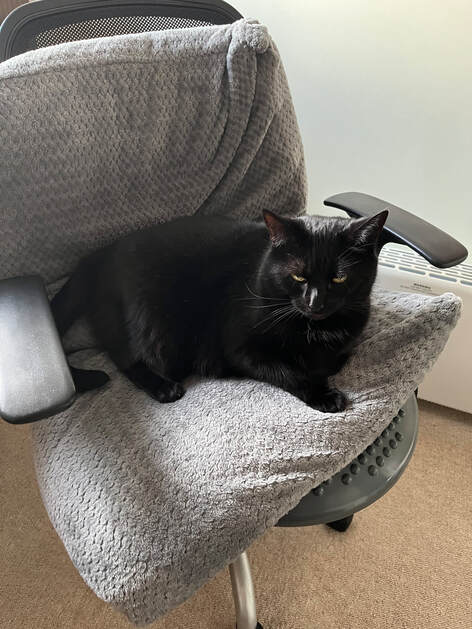
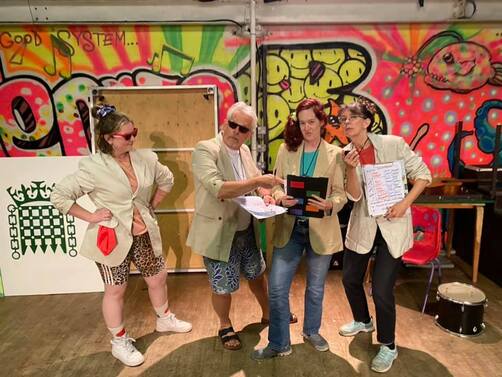
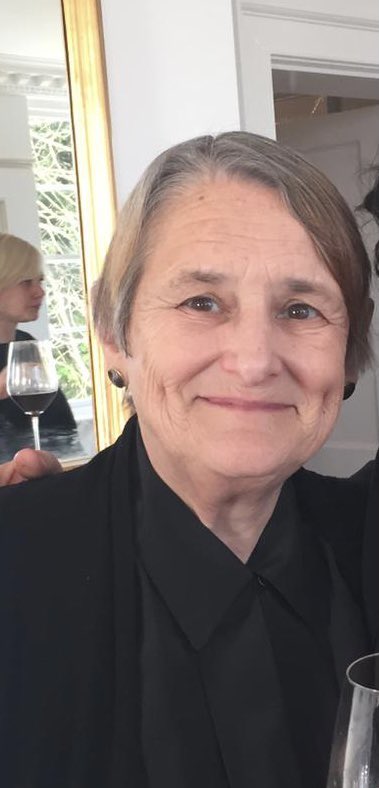
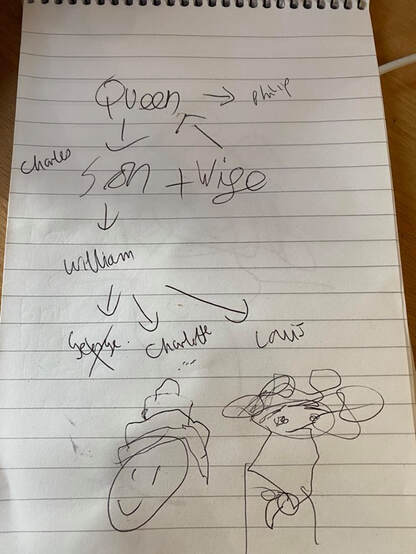
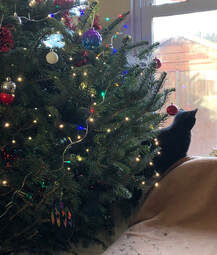
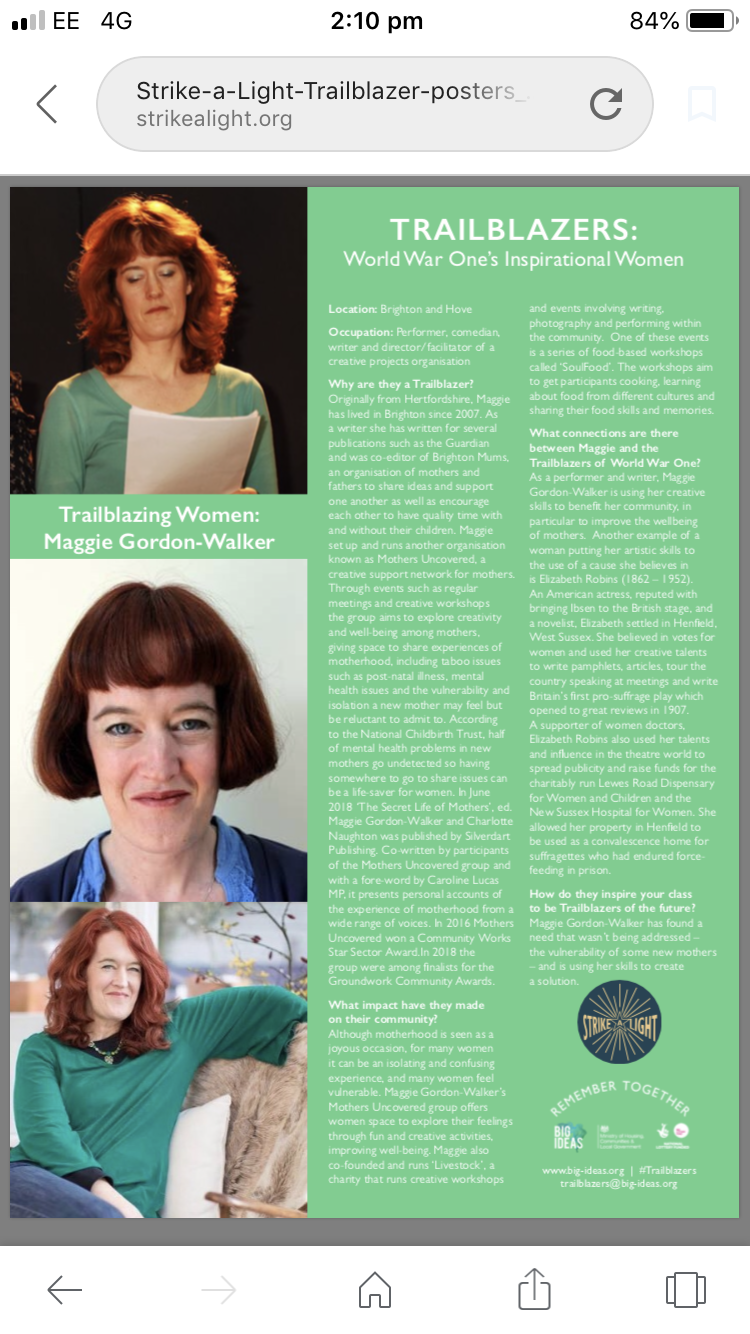
 RSS Feed
RSS Feed
